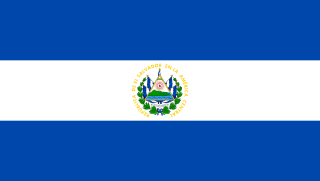
El Salvador competed at the 2016 Summer Olympics in Rio de Janeiro, Brazil, from 5 to 21 August 2016. This was the nation's eleventh appearance at the Summer Olympics, although it first competed in 1968.

Kosovo participated at the 2016 Summer Olympics in Rio de Janeiro, Brazil from 5 to 21 August 2016. It was represented by the Olympic Committee of Kosovo (KOK/OKK) with a delegation of eight people, including three men and five women. Most of them were awarded places in their respective sporting events through wild card entries and Tripartite Commission invitations. Two Kosovar athletes, on the other hand, qualified directly for the Olympics on merit: judoka Nora Gjakova and Majlinda Kelmendi, the lone returning Olympian on the team after representing Albania four years earlier in London. The world's top-ranked judoka in her weight category and the frontrunner for the country's first Olympic medal, Kelmendi was selected to become Kosovo's flag bearer in the opening ceremony.

United Arab Emirates competed at the 2016 Summer Olympics in Rio de Janeiro, from 5 to 21 August 2016. This was the nation's ninth consecutive appearance at the Summer Olympics.
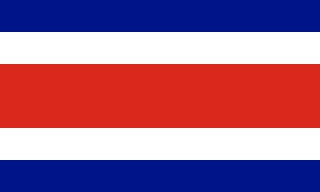
Costa Rica competed at the 2016 Summer Olympics in Rio de Janeiro, Brazil, from 5 to 21 August 2016. This was the nation's fifteenth appearance at the Summer Olympics, since its debut in 1936.

Bolivia competed at the 2016 Summer Olympics in Rio de Janeiro, Brazil, from 5 to 21 August 2016. This was the nation's fourteenth appearance at the Summer Olympics, since its debut in 1936.

Gabon competed at the 2016 Summer Olympics in Rio de Janeiro, Brazil, from 5 to 21 August 2016. This was the nation's tenth appearance at the Olympics.

Zambia competed at the 2016 Summer Olympics in Rio de Janeiro, Brazil, from 5 to 21 August 2016. This was the nation's thirteenth appearance at the Summer Olympics, although it marked its official debut in 1964 under the name Northern Rhodesia. Zambia missed the 1976 Summer Olympics in Montreal, because of its partial support to the African boycott.

Tajikistan competed at the 2016 Summer Olympics in Rio de Janeiro, Brazil, from 5 to 21 August 2016. This was the nation's sixth consecutive appearance at the Summer Olympics in the post-Soviet era.

Mozambique competed at the 2016 Summer Olympics in Rio de Janeiro, Brazil, from 5 to 21 August 2016. This was the nation's tenth consecutive appearance at the Summer Olympics.

Samoa competed at the 2016 Summer Olympics in Rio de Janeiro, Brazil, from 5 to 21 August 2016. This was the nation's ninth consecutive appearance at the Summer Olympic Games, although it had previously competed in four editions under the name Western Samoa.
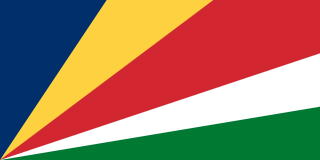
Seychelles competed at the 2016 Summer Olympics in Rio de Janeiro, Brazil, from 5 to 21 August 2016. This was the nation's eighth appearance at the Summer Olympics, with the exception of the 1988 Summer Olympics in Seoul because of its partial support to the North Korean boycott.
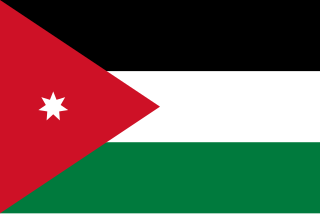
Jordan competed at the 2016 Summer Olympics in Rio de Janeiro, Brazil, from 5 to 21 August 2016. This was the nation's tenth consecutive appearance at the Summer Olympics.

Ghana competed at the 2016 Summer Olympics in Rio de Janeiro, Brazil, from 5 to 21 August 2016. This was the nation's fourteenth appearance at the Summer Olympics, having taken part in all but three editions since its debut at the 1952 Summer Olympics. Ghana did not attend the 1976 Olympics because of the African boycott and did not attend the 1980 Olympics because of the United States boycott.

Lebanon competed at the 2016 Summer Olympics in Rio de Janeiro, Brazil, from 5 to 21 August 2016. This was the nation's 17th appearance at the Summer Olympics. Lebanon did not attend the 1956 Summer Olympics in Melbourne, as a response to the Suez Crisis.
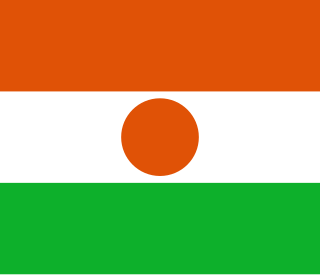
Niger competed at the 2016 Summer Olympics in Rio de Janeiro, Brazil, from 5 to 21 August 2016. Since the nation made its debut in 1964, Nigerien athletes had participated in every edition of the Summer Olympic Games, except for two rare occasions, the 1976 Summer Olympics in Montreal, and the 1980 Summer Olympics in Moscow because of the African and the US-led boycotts, respectively.

Mali competed at the 2016 Summer Olympics in Rio de Janeiro, Brazil, from 5 to 21 August 2016. Since the nation made its debut in 1964, Malian athletes had appeared in every edition of the Summer Olympic Games, with the exception of the 1976 Summer Olympics in Montreal because of the African boycott.

Burkina Faso competed at the 2016 Summer Olympics in Rio de Janeiro, Brazil, from 5 to 21 August 2016. This was the nation's ninth appearance at the Summer Olympics, having participated since the 1972 Summer Olympics in Munich under the name Upper Volta.

Turkmenistan competed at the 2016 Summer Olympics in Rio de Janeiro, Brazil, from 5 to 21 August 2016. This was the nation's sixth consecutive appearance at the Summer Olympics in the post-Soviet era.

Madagascar competed at the 2016 Summer Olympics in Rio de Janeiro, Brazil, from 5 to 21 August 2016. This was the nation's twelfth appearance at the Summer Olympics, with the exception of the 1976 Summer Olympics in Montreal and the 1988 Summer Olympics in Seoul, because of the African and North Korean boycott, respectively.

Pakistan competed at the 2016 Summer Olympics in Rio de Janeiro, Brazil, from 5 to 21 August 2016. This was the nation's seventeenth appearance at the Summer Olympics. Pakistan has not won any medal since 1992 Summer Olympics.




















